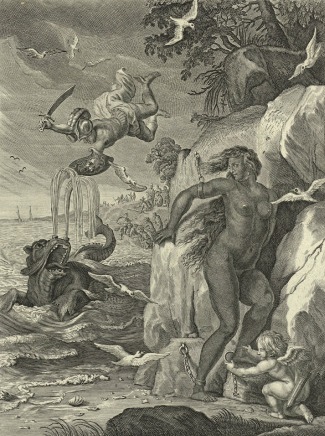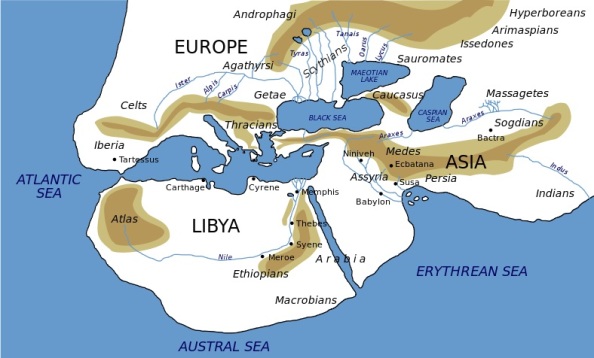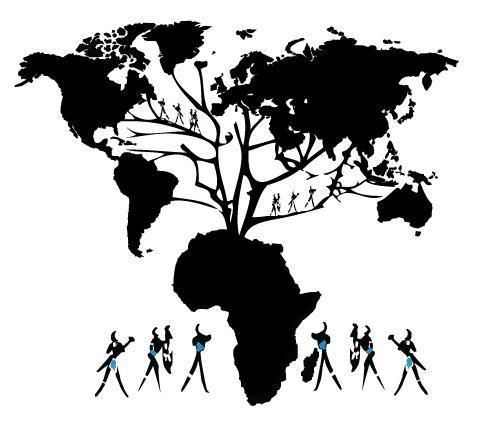During my undergraduate degree in environmental studies, a particular course in the history department caught my eye.
This course was called History of Africa South of the Sahara.
I first I discovered this course during my first year while thumbing through the course catalogue planning for my upper years.
Ooh, this would be an interesting elective, I thought upon reading the course description:
This course is a survey of sub-Saharan African History from the Iron Age to the immediate post-colonial period…. We will look at the development of traditional African cultures and lifestyles, and the establishment of kingdoms and empires, before examining European occupation, the colonial era, the drive for independence, and the modern states.
And so at the end of my second year, I tried to register for the course for my third year elective.
Only for whatever reason, the course wasn’t going to be offered during my third year. This didn’t faze me, though, for I still had another year to work with.
And so once again, I tried to register for the course at end of my third year to take as an elective during the fourth and final year of my degree program.
The course wasn’t offered that particular year either.
I graduated in the spring of that year, but not without first checking to see if the course was going to be offered in the fall.
No such luck. Thus was I forced to resign myself to never being about to take this course.
(Literally) ancient history
History was always one my favourite subjects in grade school, and my love of the discipline has survived to this day.
(As a writer of historical fiction, I should certainly hope it had.)
My particular interest, though, has always been ancient history, from the prehistoric “caveman” times and the origins of humanity up to around the Renaissance and dawn of scientific rationalism before the world started to get really polluted and mechanized during the Industrial Revolution.
This may be the result of a thrilling course I took in high school that covered the prehistoric era, Ancient Greece, Ancient Egypt, and the Roman period (sadly stopping short of the medieval period, which has always been a particular favourite of mine). Alternatively, my pre-existing interest in ancient history may be what helped make the course so thrilling to begin with.
I also have an especial historical interest in people who history has traditionally been overlooked: women, children, slaves and other non-citizens. The people who lost the war. The people whose culture – if not their entire existence, in any number of ways – was either erased or subsumed by the winners.
Like many public school students in North America, at least during junior high, I learned about black history during the month of February. Black History Month.
In particular, I recall my grade 8 history teacher, who made a point to teach us about important black people we previously hadn’t learned about, like George Washington Carver, Benjamin Banneker, and Scott Joplin, in additional to well-known civil rights luminaries like Martin Luther King Jr., Rosa Parks, and Malcolm X.
We also learned a whole lot – a whole lot – about slavery in antebellum America.
Stunted roots
To this day, slavery seems to be the number one topic of black history covered at any length in mainstream society.
Slavery is definitely an important topic. I’m not in any way suggesting we stop telling stories and learning about this crucial part of our history whose legacy still affects black people and society in general to this day.

Perseus and Andromeda print by Bernard Picart (1731) after Abraham van Diepenbeeck (1655), showing Andromeda as noticeably dark-skinned
But our history doesn’t start at this point. Logically, we know that the Trans-Atlantic Slave Trade wasn’t the first time anyone in the world ever saw or interacted with black people.
Yet overwhelmingly, this single aspect of the history of a very large continent and its people is the only one we ever hear about. As if that’s all the dominant members of society want to either know or have known.
What happened to the ancient history of black people? The stuff I was supposed to learn about in that elective university course?
A lot of it, we already know, was willfully destroyed. Slaves brought from Africa to the Americas and the Caribbean were forcibly separated from their ancestry, their religious practices, and were even compelled to assume new names.
Most white people can proudly assert their ancestry to a given country in Europe, often divvying up their heritage into so many slivers of antecedent pie going back a number of generations.
Most black people born in the western world, meanwhile, myself included, don’t even know what region of Africa their forbearers hail from, let alone which specific country. (Although I recently read the transcript of an interview on NPR discussing how DNA technology and genetic testing is being used to help African-Americans uncover this information.)
Many blacks can claim the Caribbean into their background to some extent – again, this applies to me. Yet here we come up against the slave trade once again, it being the reason blacks wound up in the Caribbean to begin with.
Unknown or untold?
For me personally, as a lover of ancient history and writer of ancient historical fiction in particular, and as a proponent of diversity in media in general, my immediate concern is less about which African nation my ancestors hail from.
Rather, I’m interested in examples from our mythic past that can inspire us and help us develop a fuller sense of ourselves as one of the oldest races of people on the planet.
I often wonder things like what was happening in Africa during my beloved medieval times? What was going on there while democracy was being born in Ancient Greece? What was Africa even like during the Iron Age?
In not having any ready answers from either school or popular culture, I find myself curious if as much black ancient history has truly been as lost as seems the case, or instead if certain known facts from the historical record have been conveniently omitted from mainstream education and entertainment.
I find myself convinced that more has to be known than just the ancient history of Egypt, which is often viewed as separate from Africa proper, the Dark Continent in more ways than one since Egypt’s inhabitants are often lighter-skinned with less Afrocentric features.
An interesting fact I recently happened upon as I continue to research Ancient Greece for my next novel has to do with Andromeda, the mythological figure for whom the next closest galaxy to our Milky Way is named.
Andromeda was beautiful princess who was rescued by Perseus after being chained naked to a rock for sacrifice to a sea monster as penance for her mother having angered the gods. Andromeda was also from the kingdom of Aethiopia (i.e. Ethiopia).
While this doesn’t correspond geographically with modern-day Ethiopia, the Greek word Aithiopes (Ethiopian) means “burnt-faced ones”, and was supposedly a term used to describe any dark-skinned person from Africa.
This particular article makes a pretty compelling augment for the fact that Andromeda may have been black. I don’t know how much support this idea has within the Classics community at large, but regardless, the concept of Aithiopes – the fact that the Ancient Greeks had at least some contact with Ancient Africans – wasn’t something I learned in my thrilling high school ancient history class, or during any February in junior high.

The inhabited world according to Herodotus. The Ancient Greeks called what they knew of Africa “Libya” and the people of its southernmost fringes “Ethiopians” after their dark skin.
Writing what I want to know
Learning more about the ancient history of black people has become a growing research interest for me.
I want to learn about it and I want to write about.
This matters to me because history and myth are the foundations of humankind’s heroic conceptions of itself. These conceptions strengthen our desire and determination to become the positive forces of change society needs as the world grows increasingly troubled and complex.
I discovered long ago that if you truly want to learn something, one of the best ways to do so is by forgetting about what they’re teaching in school and studying the topic on your own.
There’s an astounding amount of knowledge out there, especially in the age of the Internet, with people researching and writing about things we mightn’t even realize exists until we go searching for it.
Such was certainly the case during the last stretch of my high school ancient history class when I told the teacher I wanted to do an independent study of women in the medieval times for my final term paper.
“Good luck,” he told me with a scoff, as if believing I wouldn’t find enough sources to fill a twenty page term paper.
I found enough to go on and write a 900+ page trilogy.
I’m hoping the same thing will happen once again.
What things would you like to see better explored in school or mainstream media? Tell me about it in the comments.
(Image source #1, #2, and #3)


I really enjoyed this post. You touched on many things I didn’t know about and broadened my understanding of what I thought I did.
Thanks for sharing
LikeLike
I’m glad you liked it! I aim to both educate and entertain.
LikeLiked by 1 person
Excellent post. I recommend the book, Black Genesis, The Prehistoric Origins of Ancient Egypt, by Robert Bauval & Thomas Brophy PhD. This book was featured on the History channel and presents proof that an advanced black African civilization inhabited the Sahara long before Pharaonic Egypt.
LikeLike
Thank you for the recommendation, Rita. That sounds intriguing and very much the sort of thing I’m interested in learning more about. I’ll definitely check it out!
LikeLike
I feel exactly the same your post was very good have you seen Ashra kwesi tour of ancient Kemet. There is also a book when we ruled that is excellent but costly. I am going to reblog this. It is really uplifting to discover your actual history. I also intend to move in that direction on my own blog.
LikeLike
I was not familiar with Ashra Kwesi’s tours. It looks very exciting; I’m sure it is indeed “a trip of a lifetime”. I find that the third party sellers on Amazon is often a good way to find rare reference books for cheap. Often it is library discards that are being sold, so they have all the library barcodes and plastic book jackets on them, but inside the text is perfect. Good luck with your blog and in continuing to research your history.
LikeLike
Reblogged this on Black History & Culture.
LikeLike
Pingback: Cuban-Dutch ancient shipwrecks research | Dear Kitty. Some blog